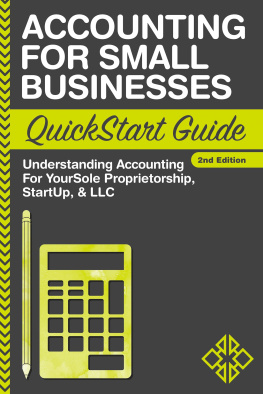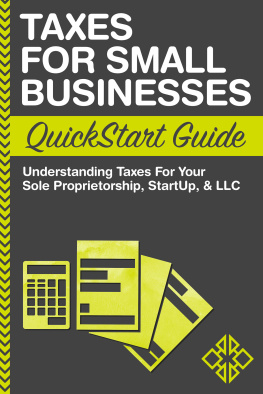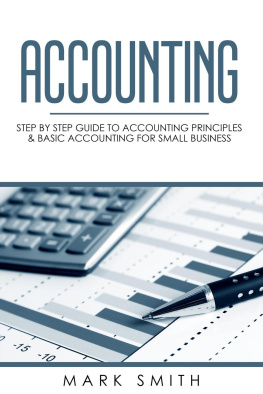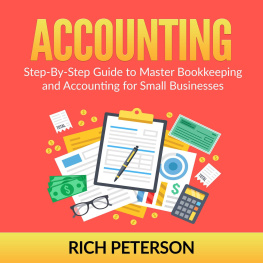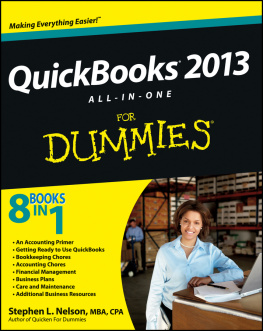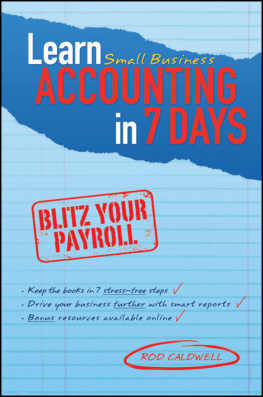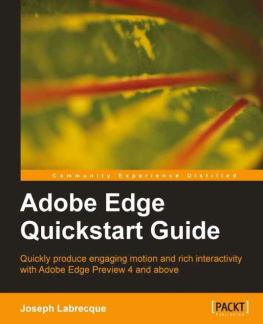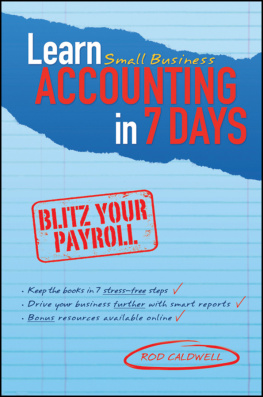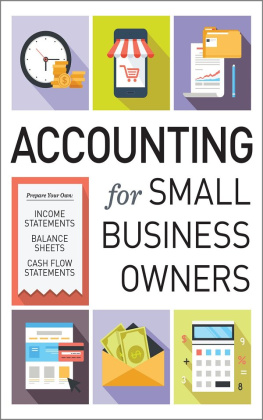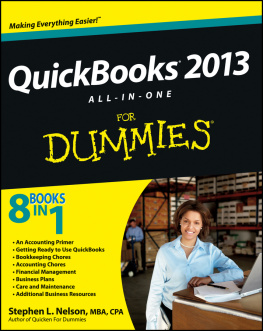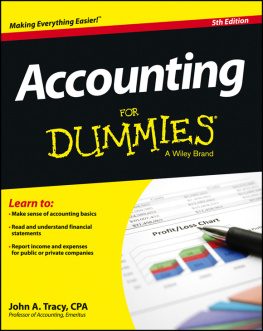Josh Bauerle - Accounting For Small Businesses QuickStart Guide
Here you can read online Josh Bauerle - Accounting For Small Businesses QuickStart Guide full text of the book (entire story) in english for free. Download pdf and epub, get meaning, cover and reviews about this ebook. year: 2017, publisher: ClydeBank Media LLC, genre: Romance novel. Description of the work, (preface) as well as reviews are available. Best literature library LitArk.com created for fans of good reading and offers a wide selection of genres:
Romance novel
Science fiction
Adventure
Detective
Science
History
Home and family
Prose
Art
Politics
Computer
Non-fiction
Religion
Business
Children
Humor
Choose a favorite category and find really read worthwhile books. Enjoy immersion in the world of imagination, feel the emotions of the characters or learn something new for yourself, make an fascinating discovery.
- Book:Accounting For Small Businesses QuickStart Guide
- Author:
- Publisher:ClydeBank Media LLC
- Genre:
- Year:2017
- Rating:3 / 5
- Favourites:Add to favourites
- Your mark:
- 60
- 1
- 2
- 3
- 4
- 5
Accounting For Small Businesses QuickStart Guide: summary, description and annotation
We offer to read an annotation, description, summary or preface (depends on what the author of the book "Accounting For Small Businesses QuickStart Guide" wrote himself). If you haven't found the necessary information about the book — write in the comments, we will try to find it.
Accounting For Small Businesses QuickStart Guide — read online for free the complete book (whole text) full work
Below is the text of the book, divided by pages. System saving the place of the last page read, allows you to conveniently read the book "Accounting For Small Businesses QuickStart Guide" online for free, without having to search again every time where you left off. Put a bookmark, and you can go to the page where you finished reading at any time.
Font size:
Interval:
Bookmark:

Contents
Terms displayed in bold italic can be found defined in the glossary

DOWNLOAD YOUR FREE DIGITAL ASSETS!
Visit the URL below to access your free Digital Asset files that are included with the purchase of this book.

DOWNLOAD YOURS HERE:
www.clydebankmedia.com/accounting-assets
Introduction
Learning the fundamentals of accounting is like learning a new language. Becoming literate in accounting doesnt take quite as long as learning Russian, Spanish, or Chinese, but the advantages are indeed comparable.
Its safe to say that many people fear numbers I was terrible at math in school! so the word accounting calls up, for many, memories of days spent struggling over high school algebra. They prefer to leave the accounting to those who hang a CPA shingle outside their doors, confident that the professionals will do a much better job of managing their money.
But the fact remains that everyone should have a little accounting knowledge and, truly, the math involved isnt all that difficult. Nonetheless, knowing the basics, from how to balance your checkbook to learning to keep good financial records for tax purposes, goes a long way, whether youre a small business owner, investor, manager, lender, or just in charge of the household finances.
Having a clear knowledge of your businesss financial life is important. No one should be in the dark about his or her overall financial picture. Thats a disaster waiting to happen. However, with a perfunctory knowledge of basic accounting principles, including assets and liabilities, creating financial statements, budgeting, and more, youll be on the road to a healthier relationship with your money.
| 1 | The Importance of Good Accounting
There are a number of reasons to educate yourself on the particulars of accounting, some of them are quite basic but ultra-important.
Taking Control of Your Cash Flow
Small business owners tend to seek out help from accounting professionals when they notice that their businesses are having a difficult time managing cash flow, namely when they keep running out of cash, even though business seems to be moving along at a decent pace. Being able to model the businesss financial activity using some basic accounting principles goes a long way toward identifying the source of the problems at hand and coming up with solutions.
Clear Profit/Loss Statements
If youre a small business owner with a lot of cash coming in and going out, then it can be difficult to figure out how much money youre actually making. Maybe youre considering buying a new house or car, or perhaps youve got a child headed to college. Fundamental accounting knowledge allows you to create clear profit-loss statements and to readily identify the value of your equity in your business. Furthermore, accounting literacy gives your business the power of financial forecasting, with which you can make optimal decisions to keep your business profitable.
Getting a Loan for Your Business
Maybe youve got a business model thats working well and you want to expand fast before swarms of copycats beat you to the punch. Or perhaps your business isnt doing so well financially, but you can make a pretty good case that a little capital support would quickly turn things around. Banks, lenders, and investors want to see properly-prepared financial statements before deciding whether or not to let you use their hard-earned money.
Preventing Fraud
Small businesses are at a bit of disadvantage when it comes to fraud prevention. To prevent fraud, larger companies often spread accounting responsibilities out over multiple parties and even departments. In small businesses, only one person often controls the books, and the business is forced to rely on both the integrity and competency of this person, who is often not even a professional accountant, but a bookkeeper (theres a big difference). If the owner or manager of the business has a fundamental understanding of accounting principles, then theres a much better chance for sound oversight and fraud prevention. Chapter 4 talks more about fraud.
One of the common misconceptions about accounting is that its essentially the same thing as bookkeeping. In reality, accounting encompasses a much broader field of practice. Bookkeeping simply tracks the businesss financial activities. It does not incorporate the critical analyses and specialized reporting that make accounting such a powerful resource for businesses of all sizes.
The accountant takes the numbers that the bookkeeper collects and translates them into a story, which he or she then relays to the businesss decision-making executives. The accountant (usually acting in the capacity of a CFO ) is responsible for discerning how these numbers have affected and will affect the business. Not to overly-dramatize an already terribly exciting profession, but if bookkeepers and accountants were likened to CIA surveillance operatives, then the bookkeepers would be responsible for setting up the surveillance equipment and recording and logging all of the incoming information, whereas the accountants would be in charge of discerning all actionable economic intelligence and reporting their findings in such a way that the special agents would know precisely where, when, and how to take action. Accountants are strategists, interpreters, and storytellers, responsible for relaying information from the world of numbers to the world of business.
| 2 | Balancing Your Checkbook
Good accounting starts with the most basic of tasks, such as learning to properly balance your checkbook. This might seem like a given, but there are people (and businesses) who struggle with this each and every month and never seem to get it right. The result, unfortunately, is often a chronically unbalanced account that gets worse and worse each month. But it doesnt have to be that way if you invest a little time in this task.
Reviewing Your Bank Statement
So, your monthly bank statement has arrived and its time to reconcile it. Here are a few simple steps to help you do this with ease:
Record Your Income & Transactions
Banks dont return canceled checks anymore, but they do provide digital images of those checks once theyve cleared. Sit down with your statement and match each of those checks to the entries in your checkbook. Match check numbers as well as the amounts of the checks. Mark off each one youve matched. Note that when you pay bills electronically, banks do not include digital images of these e-checks along with your other checks
Verify Any Automatic Debits
Many people pay their insurance via a monthly withdrawal (debit) thats made by the vendor. Hopefully, youve allowed for these and have kept enough money in your account to cover them! Verify the amount deducted and where it was sent, just to be sure no changes were made since you first set up these payment plans.
Check Your Deposits
Hopefully, youve kept deposit receipts or have carefully entered them into your checkbook ledger. Check the amounts and dates. Remember, electronic deposits perhaps paid to you by a customer or client may take a few days to clear, so if theyre made near the end of the month, they may appear on the next months statement instead.
Font size:
Interval:
Bookmark:
Similar books «Accounting For Small Businesses QuickStart Guide»
Look at similar books to Accounting For Small Businesses QuickStart Guide. We have selected literature similar in name and meaning in the hope of providing readers with more options to find new, interesting, not yet read works.
Discussion, reviews of the book Accounting For Small Businesses QuickStart Guide and just readers' own opinions. Leave your comments, write what you think about the work, its meaning or the main characters. Specify what exactly you liked and what you didn't like, and why you think so.

